|
lemonade kid
Old Love
    
USA
9876 Posts |
 Posted - 30/07/2012 : 19:17:54 Posted - 30/07/2012 : 19:17:54


|
Listen with intense pleasure to the whole 1:15 hours of music, right here, for instant gratification, & read on....
Joe's Garage Acts I, II & III...full album play
http://www.youtube.com/watch?v=anAMdoKz1-0
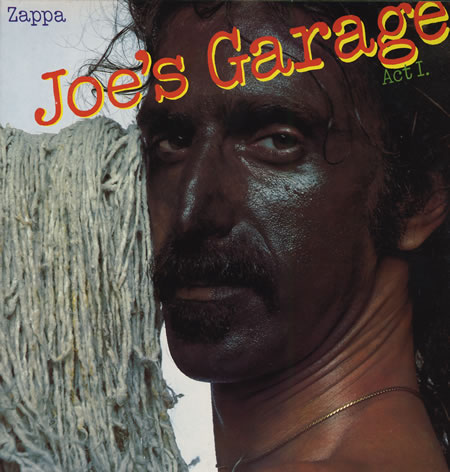
The Central Scrutinizer is out to protect you from the harmful effects of that horrible force called music. Such is the premise of Joe's Garage, Frank Zappa's three-act concept album which explores the world of groupies, governments, sex toys, and Catholic school girls. As always, Zappa's aim is true and his scope wide, following Joe (voiced by his long-time co-conspirator, Ike Willis) as he starts a band, loses his girl, falls in love with a robot, and tries to find his true place in society. Filled with catchy classics ("Catholic Girls" "Crew Slut") and blazing guitar work ("Keep it Greasy," "Watermelon in Easter Hay"), this is the sort of smorgasbord of imagination and artistry that only Zappa could produce. --Andrew Boscardin
.....................................................................
JOE'S GARAGE-Acts I, II & III-ZAPPA
Frank Zappa is one of the most interesting and talented persons in the history of music. That people are still writing reviews of his music more than 10 years (and counting) after his death is only partial testament to that fact.
Some of the rest of the proof lies in this album. Nowhere else in his recorded history, save perhaps for "Freak Out!" were Frank's warring perceptions of life more on display for all to hear.
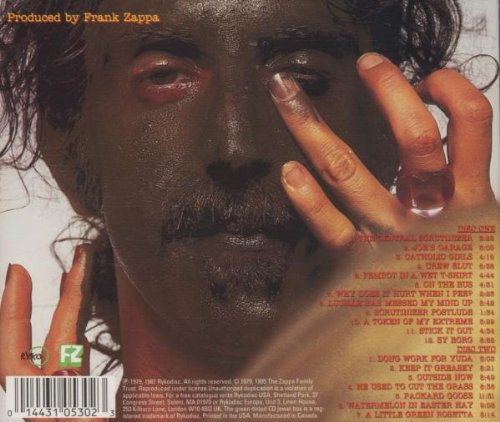
Zappa's dislike/disdain/contempt for all sorts of things are in ready supply in Joe's Garage, but unlike many of Frank's other works where deliberately offensive (depending on one's point of view) lyrics were surrounded by equally, er, peculiar music, there is a strong counterbalance of humanity interlaced; primarily through the sympathetic treatment of the doomed musician "Joe" in the musical and lyrical compositions.
Zappa was coming out of an exhausting legal battle with Warner Brothers in which he put out three intentionally uncommercial largely instrumental albums together to fulfill his contractual obligations (SD/ST/OF), and after taking some pointless swipes at cultural dislikes (in SYB), he was ready to articulate his real soul.
That soul was, of course, all about music and freedom. Zappa rails with real passion lyrically and musically against repression; against religious, corporate and governmental control and censorship of any kind.
So in between your titters or scowls at the various explicit scatological/sexual references; listen for the heart of Frank Zappa - Joe's Garage (love of music), Lucille (innocent love versus painful - no pun intended - realities), Sy Borg (love of technology, so to speak), Outside Now (anger, despair), Packard Goose (a shout-out to his fans, another poignant ode to music and a wicked stab at music "critics") and finally Watermelon in Easter Hay (resignation about the state of humanity -- one of the saddest and most beautiful songs ever laid to vinyl/digital).
A last comment about this album - you are not likely elsewhere to hear any drumming quite like what you find on this album - an impressive blend of composition, technology and technique. Zappa ALWAYS had great musicians playing with him, eager for the challenges that were provided for them by playing in his band...
....................................................................
Joe's Garage is a 1979 rock opera by Frank Zappa originally released as two separate studio albums on Zappa Records. The project was later remastered and reissued as a triple album box set, Joe's Garage, Acts I, II & III, in 1987. The story is told by a character identified as the "Central Scrutinizer", narrating the story of Joe, an average adolescent male, who forms a garage rock band, gives all of his money to a government assisted but insincere religion, explores unusual sexual activities with appliances, and is imprisoned. After being released from prison into a dystopian society in which music itself has been criminalized, he lapses into insanity.
The album encompasses a large spectrum of musical styles, while its lyrics often feature satirical or humorous commentary on American society and politics. It addresses themes of individualism, free will, censorship, the music industry and human sexuality, while criticizing government and religion, and satirizing Catholicism and Scientology. Joe's Garage is noted for its use of xenochrony, a recording technique that takes guitar solos from older live recordings and overdubs them onto new studio recordings. All of the guitar solos on the album are xenochronous except for "Watermelon in Easter Hay", a signature song that Zappa has described as the best song on the album, and according to his son Dweezil, the best guitar solo his father has ever played.
The album initially received mixed to positive reviews, with critics praising its innovative and original music, but criticizing the scatological, sexual and profane nature of the lyrics. Since its original release, Joe's Garage has been reappraised as one of Zappa's best works.
LINER NOTES--
"Eventually it was discovered, that God did not want us to be all the same. This was Bad News for the Governments of The World, as it seemed contrary to the doctrine of Portion Controlled Servings. Mankind must be made more uniformly if The Future was going to work. Various ways were sought to bind us all together, but, alas, same-ness was unenforceable. It was about this time, that someone came up with the idea of Total Criminalization. Based on the principle, that if we were all crooks, we could at last be uniform to some degree in the eyes of The Law. [...] Total Criminalization was the greatest idea of its time and was vastly popular except with those people, who didn't want to be crooks or outlaws, so, of course, they had to be Tricked Into It... which is one of the reasons, why music was eventually made Illegal."
- Joe's Garage Acts II & III liner notes, 1979.
The lyrical themes of Joe's Garage involve individualism, sexuality, the danger of large government, and "the foolishness of white males", according to Kelly Fisher Lowe in The Words and Music of Frank Zappa.[1]:149 The album is narrated by a government employee identifying himself as The Central Scrutinizer, who delivers a cautionary tale about Joe, a typical adolescent male who forms a band as the government prepares to criminalize music.[1]:150 The Central Scrutinizer explains that music leads to a "slippery slope" of drug use, disease, unusual sexual practices, prison, and eventually, insanity.[1]:150 According to Scott Schinder and Andy Schwartz, Zappa's narrative of censorship reflected the censorship of music during the Iranian Revolution of 1979, where rock music was made illegal.[2]:370
The title track is noted as having an autobiographical aspect, as the character of Larry (as performed by Zappa himself) sings that the band plays the same song repeatedly because "it sounded good to me".[1]:150 In real life, Zappa said he wrote and played music for himself, his sole intended audience.[1]:150 The song also takes lyrical inspiration from bands playing in bars like The Mothers of Invention once had, and shady record deals Zappa had experienced in the past.[1]:150 In "Joe's Garage", Joe finds that the music industry is "not everything it is cracked up to be".[1]:151 The song refers to a number of music fads, including new wave, heavy metal, disco and glitter rock, and is critical of the music industry of the late 1970s.[1]:151
"Catholic Girls" is critical of the Catholic Church, and satirizes "the hypocrisy of the myth of the good Catholic girl."[1]:151 While Zappa was in favor of the sexual revolution, he regarded himself as a pioneer in publicly discussing honesty about sexual intercourse, stating
American sexual attitudes are controlled as a necessary tool of business and government in order to perpetuate themselves. Unless people begin to see through that, to see past it to, what sex is really all about, they're always going to have the same neurotic attitudes. It's very neatly packaged. It all works hand-in-hand with the churches and political leaders at the point, where elections are coming up.[7]
This view inspired the lyrical content of "Crew Slut", in which Mary, Joe's girlfriend, falls into the groupie lifestyle.[7]
"Why Does It Hurt When I Pee?" was written in the summer of 1978.[9] Zappa's road manager, Phil Kaufman, alleged, that the song was written after Kaufman had asked that very question; within the context of the album's storyline, it is sung by Joe after he receives a sexually transmitted disease from Lucille, "a girl, who works at the Jack in the Box".[9] The Central Scrutinizer continues to express the hypothesis that "girls, music, disease, heartbreak [...] all go together."[1]:155 Halfway through the album's libretto, Zappa expressed the belief, that governments believe, that people are inherently criminals, and continue to invent laws, which gives states the legal grounds to arrest people, leading to the fictional criminalization of music, which occurs towards the end of the album's storyline.[1]:155
"A Token of My Extreme" satirizes Scientology and L. Ron Hubbard, as well as new age beliefs and the sexual revolution.[1]:155[10]:114 It describes an insincere religion, which co-operates with a "malevolent totalitarian regime."[11] "Stick It Out" contains lyrical references to Zappa's songs "What Kind Of Girl", "Bwana Dik" and "Dancin' Fool".[12] "Dong Work For Yuda" was written as a tribute to Zappa's bodyguard, John Smothers, and features Terry Bozzio imitating Smothers' dialect and speech.[13] "Keep It Greasy" is a lyrical tribute to anal sex.[1]:157 Following Joe's imprisonment and release, the libretto describes a dystopian future, accompanied musically by long guitar solos, which Joe imagines in his head.[1]:159 "Packard Goose" criticizes rock journalism, and features a philosophical monologue delivered by the character Mary, who had been absent since the first act.[1]:158-159
Music and performance
Joe's Garage is noted for its extensive guitar-oriented work, including live improvisations which were incorporated into new studio compositions using xenochrony.
The music of Joe's Garage encompassed a variety of styles, including blues, jazz, doo wop, lounge, orchestral, rock, pop and reggae.[1] "Catholic Girls" makes musical reference to Zappa's controversial song "Jewish Princess", as a sitar plays the melody of the earlier song during the fadeout of "Catholic Girls".[1] "Crew Slut" is performed as a slow blues song, with slide guitar riffs and a harmonica solo.[1]:152-153[4]:333 According to Kelly Fisher Lowe, the song is "more Rolling Stones or Aerosmith than it is Gatemouth Brown or Guitar Watson".[1]:152-153 The extended, more than three and a half minute, two-part guitar solo in "Toad-O-Line" is taken from Zappa's earlier song "Inca Roads"/"Occam's Razor".[14]
"A Token Of My Extreme" originated as an instrumental, which opened Zappa's concerts in 1974; a recording of the original version of this piece was released under the title "Tush Tush Tush (A Token of My Extreme)" on You Can't Do That on Stage Anymore, Vol. 2.[1]:155
"Lucille Has Messed My Mind Up" first appeared on Jeff Simmons' album of the same name.[15] The Joe's Garage arrangement is radically different, and is played as a reggae song.[15] "Stick It Out" originated as part of the Mothers of Invention's "Sofa" routine in the early 1970s.[1]:120 The Joe's Garage version is musically influenced by funk and disco, with its lyrics performed first in German, and then in English.[1]:156[16]:270 "Sy Borg" derives from funk, reggae and R&B.[1]:154, 156
"Keep It Greasy" had been performed by Zappa since 1975; the Joe's Garage album version features a guitar solo from a March 1979 live performance of the song "City of Tiny Lights".[1] Another March 1979 guitar solo from "City of Tiny Lights" is incorporated into the song "Outside Now" using the same recording technique.[1] "Packard Goose" also uses xenochrony, with its guitar solo taken from a March 1979 performance of "Easy Meat".[1]
The album concludes with a long guitar instrumental, "Watermelon in Easter Hay", the only guitar solo recorded for the album; every other guitar solo on the album was xenochronous—overdubbed from older live recordings.[1]:154:381 In their review of the album, Down Beat magazine criticized the song,:376 but subsequent reviewers have championed the song as Zappa's masterpiece. Lowe called it the "crowning achievement of the album" and "one of the most gorgeous pieces of music ever produced".[1]:159 Zappa told Niel Slaven that he thought it was "the best song on the album". After Zappa died, "Watermelon in Easter Hay" became known as one of his signature songs, and his son, Dweezil Zappa, later referred to it as "the best solo Zappa ever played".[17]:90-91
The song is followed by "A Little Green Rosetta", which was originally intended to appear on Zappa's shelved Läther album.[1]:159[18]
Release
Joe's Garage Acts II & III was released in November 1979, with cover art depicting a makeup artist applying blackface onto Zappa's face.
Joe's Garage was initially released in separate units, beginning with the single LP Act I in September 1979. For the album artwork, Zappa was photographed in blackface, holding a mop.:381 The gatefold sleeve of Act I was designed by John Williams, and featured a collage, which included a naked Maya, vague technical drawings, pyramids and fingers on the fret of a guitar.:381 The lyric insert featured similar illustrations, which related to the content of the songs and storyline. The title track was released as a single, with "The Central Scrutinizer" as its B-side. It did not chart.[19]
Act I peaked at #27 on the Billboard Pop Albums chart.[20] It was followed by the double album Acts II & III in November.[1] The gatefold of Acts II & III featured collages taken from a medical journal, while the cover for Acts II & III featured a makeup artist applying blackface makeup to Zappa's face. Acts II & III peaked at #53 on the Pop Albums chart.[21]
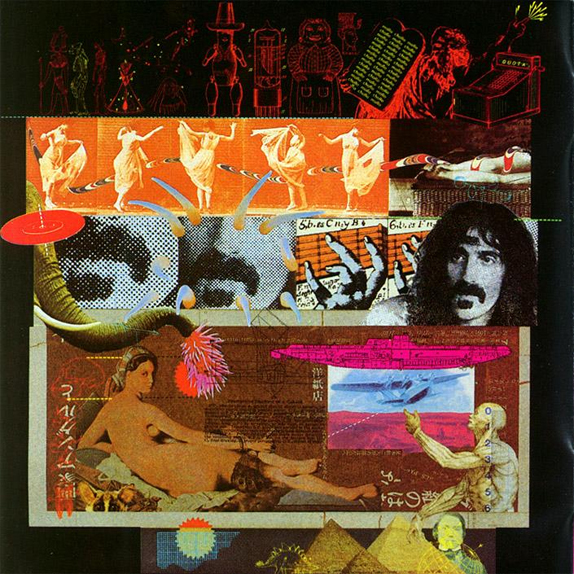
Joe's Garage was reissued in 1987 as a triple album, combining Acts I, II & III into a single box set, and as a double album on compact disc.[1] The song "Wet T-Shirt Night" received two alternate titles, when the album was released on CD: the libretto referred to the song as "The Wet T-Shirt Contest", while the back cover referred to the song as "Fembot in a Wet T-Shirt".[22] In an interview, Zappa explained that the "fembot" was the name given to a female robot in an episode of the TV series The Six Million Dollar Man.[22] Additionally, the instrumental "Toad-O Line" was renamed "On the Bus".[23] The Central Scrutinizer monologue at the end of "Lucille Has Messed My Mind Up", which concludes the story's first act, was indexed as its own track on the CD reissue, under the title "Scrutinizer Postlude".[15]
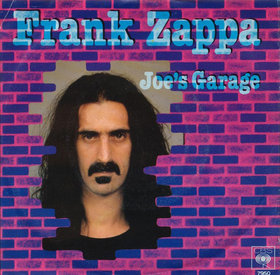
Reception and legacy
Allmusic (Acts I, II & III) 4.5/5 stars[24]
Allmusic (Act I) 3/5 stars[25]
Allmusic (Acts II & III) 3/5 stars[26]
Rolling Stone (favorable)[27]
Joe's Garage received mixed to positive reviews upon release, with criticisms aimed at its profane lyrical content, but has since been reappraised as a landmark album.[1] Allmusic writer William Ruhlmann gave 3 out of 5 stars for the individual releases Act I and Acts II & III.[25][26] Ruhlmann wrote of Act I, "although his concern with government censorship would see a later flowering in his battles with the Parents Music Resource Center (PMRC), here he wasn't able to use it to fulfill a satisfying dramatic function."[25] Ruhlmann also felt that Acts II & III "seems so thin and thrown together, musically and dramatically".[26]
Reviewing the album for Rolling Stone, Don Shewey wrote, "If the surface of this opera is cluttered with cheap gags and musical mishmash, its soul is located in profound existential sorrow. The guitar solos that Zappa plays in Joe's imagination burn with a desolate, devastating beauty. Flaws and all, Joe's Garage is Frank Zappa's Apocalypse Now."[27] The collected Acts I, II & III release received 4.5 out of 5 stars from Allmusic's Steve Huey, who wrote "in spite of its flaws, Joe's Garage has enough substance to make it one of Zappa's most important '70s works and overall political statements, even if it's not focused enough to rank with his earliest Mothers of Invention masterpieces."[24]
For his performance on Joe's Garage, Vinnie Colaiuta was named "the most technically advanced drummer ever" by Modern Drummer, which ranked the album as one of the top 25 greatest drumming performances of all time.[28]:58 On September 26, 2008, Joe's Garage was staged by the Open Fist Theatre Company in Los Angeles, in a production authorized by the Zappa Family Trust.[29]
Track listing
All songs written and composed by Frank Zappa.
Act I
No. Title Length
1. "The Central Scrutinizer" 3:28
2. "Joe's Garage" 6:10
3. "Catholic Girls" 4:26
4. "Crew Slut" 6:31
5. "Wet T-Shirt Nite" 4:45
6. "Toad-O Line" 4:19
7. "Why Does It Hurt When I Pee?" 2:36
8. "Lucille Has Messed My Mind Up" 7:17
Total length:
33:49
Act II
No. Title Length
1. "A Token of My Extreme" 5:30
2. "Stick It Out" 4:34
3. "Sy Borg" 8:56
4. "Dong Work for Yuda" 5:03
5. "Keep It Greasey" 8:22
6. "Outside Now"
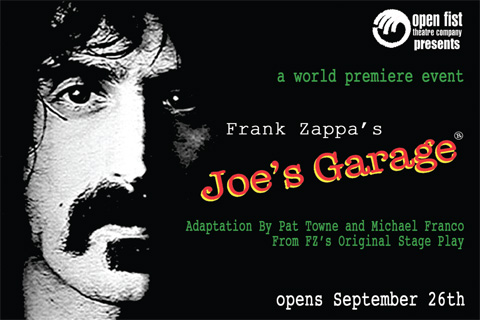
......................................................................
Have a "nice day" (whether you want it or not)....
I remember some Brits' posts some time ago--that this was the strangest American expression uttered by U.S. citizens all over the States....
Please, have a nice day!!...whatever "nice" means to you!

________________________________________________
HIGH ALL THE TIME...
-Mad River
http://www.youtube.com/watch?v=g0PCzH-K1hg
|
Edited by - lemonade kid on 30/07/2012 19:46:49 |
|


